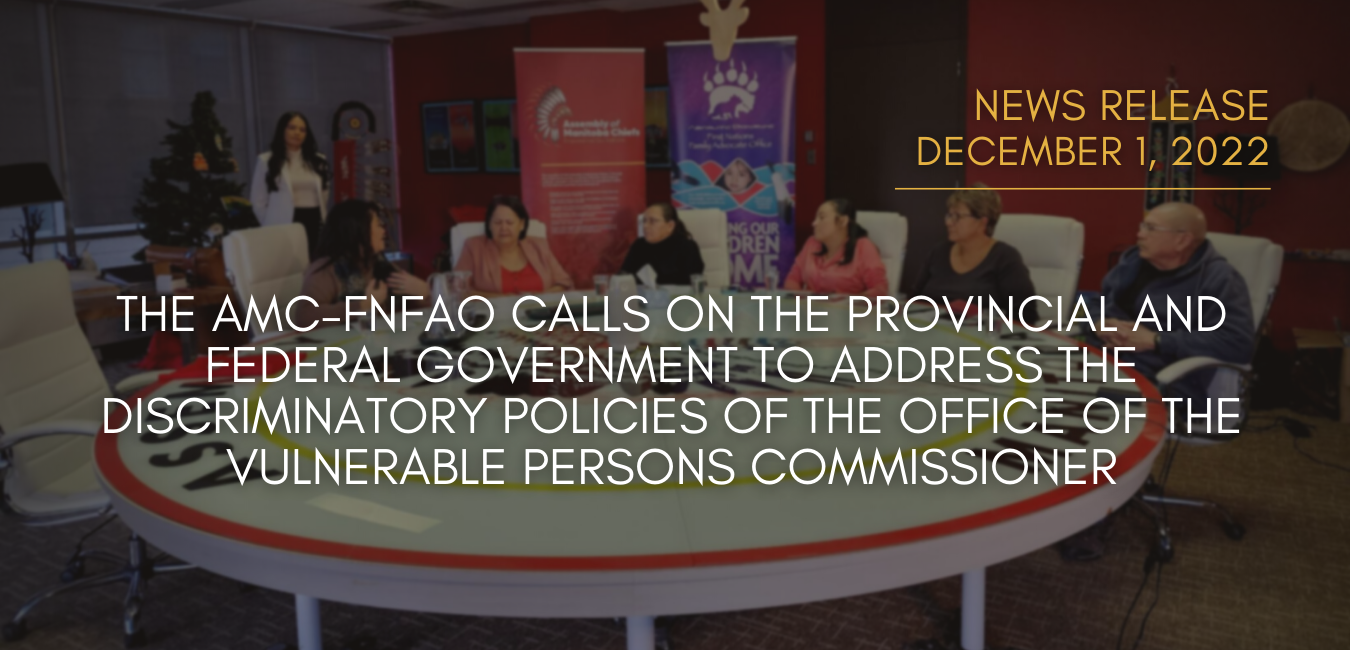The AMC-FNFAO Calls on the Provincial and Federal Government to Address the Discriminatory Policies of the Office of the Vulnerable Persons Commissioner

December 1, 2022
Treaty One Territory, Manitoba
AMC Communications
Treaty One Territory, Manitoba – The Assembly of Manitoba Chiefs First Nations Family Advocate Office (AMC-FNFAO) is currently supporting a First Nations family who is at risk of having the Public Guardian and Trustee (PGT) unnecessarily appointed to make financial decisions for their vulnerable granddaughter due to their residency on-reserve.
“We have been supporting this grandmother to continue to care for her granddaughter. However, as she is now at the age of majority, the grandmother has encountered challenges and barriers to continue receiving the same level of services. As a citizen in my Nation, she may have to relocate away from her home, family, and nation if she does not receive support. Unfortunately, the Government wants First Nations to rely on them; this is how our citizens become commodities. We are relying on other people to make determinations when we have families that are willing and fighting to care for their loved ones,” stated Chief Norman Bone, Keeseekoowenin First Nations.
According to provincial legislation, if no party is willing or able to become a Substitute Decision Maker (SDM) of a vulnerable person, then the PGT is appointed. An SDM can be appointed to manage personal affairs, including decision-making over healthcare, employment, and living arrangements. SDMs can also be appointed for the management of property and assets. To acquire an SDM for property management, the provincial policy requires that a bond be provided equally to the amount of the vulnerable person’s estate. Unfortunately, due to government policy enshrined in the Indian Act, First Nations persons are prevented from obtaining a bond through Canadian financial institutions as the Act prevents sureties from accessing on-reserve assets if there is a claim on the bond.
“As First Nations, we have a sacred and inherent responsibility to care for and ensure the well-being of all our families. The government’s paternalistic approach to governing our Nations and citizens is a way to restrict and for us to depend on the government. We continue to witness our children being institutionalized from birth to death; this is a mechanism to continue this epidemic,” stated Cora Morgan, First Nations Family Advocate.
“In Manitoba, there are 935 status First Nations under the care of the PGT. That is 935 First Nations citizens who have someone appointed to them to make determinations on their behalf and who are to have their best interest. The government has created unnecessary bureaucratic barriers for First Nations from being appointed as PGT by not allowing families living on-reserve to become bonded. History has shown how impactful governmental discriminatory practices, policies, and procedures are embedded in these colonial institutions and the lasting effects it has on our Nations. Providing authority and decision-making powers to First Nations leaders is an important step toward reconciliation and would enhance the quality of life of our vulnerable people, their families, and Nations,” concluded Grand Chief Cathy Merrick.
For more information, please contact:
Communications Team
Assembly of Manitoba Chiefs
Email: media@manitobachiefs.com
About the Assembly of Manitoba Chiefs
The AMC was formed in 1988 by the Chiefs in Manitoba to advocate on issues that commonly affect First Nations in Manitoba. AMC is an authorized representative of 62 of the 63 First Nations in Manitoba with a total of more than 151,000 First Nation citizens in the province, accounting for approximately 12 percent of the provincial population. AMC represents a diversity of Anishinaabe (Ojibway), Nehetho / Ininew (Cree), Anishininew (Ojibwe-Cree), Denesuline (Dene) and Dakota Oyate (Dakota) people.
